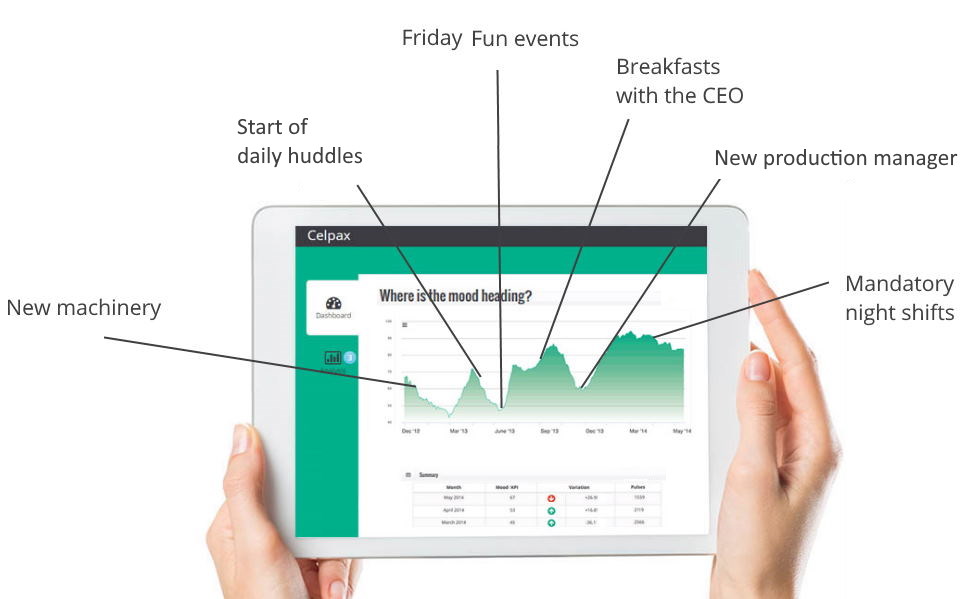Employee Mood Meter: One company’s experience
The mood meter in action
The SkillsLab facilitate cultural change that allows people to develop soft-skills needed to learn, work and lead happy lives.
This is the last part of Chris Gerry’s employee mood meter series.
I helped a large nationalised UK company install a series of mood meters.
The organisation has 28,000 employees and the part we worked with was concerned with infrastructure planning and building.
In a nondescript office block in Victoria, London, 300 people toiled in project teams to help deliver improvements for part of the UK’s transport infrastructure.
The Mood meters showed low company mood
I had been providing training to some of these groups and had noticed that employee morale was poor.
This was mostly caused by very poor internal communications.
Staff had lots of minor grievances that were festering.
These ranged from concerns about the toilets – often they did not flush — through to issues of lighting, and provision of tea and coffee.
More significantly there were complaints about communication at all levels resulting in job fears.
And alongside this, there were numerous examples of dysfunctional decision making.
Many of these just didn’t seem to make sense as they added costs against a backdrop of managers demanding cost savings.

Unanswered issues exploded
All of this came to a head one grey December morning.
It took place when over a hundred people crowded into a space without their managers present… and unleashed their frustrations and complaints to me.
Three flip chart sheets later and two hours and we had it all there in black and white.
Most of ‘it’ was minor stuff.
But as issues were unanswered they had grown in size and perception.
Alongside this was a keen sense of injustice: people ‘let go’ (fired) unfairly; individuals shabbily treated; a lack of compassion; rudeness and people being ignored.
“The problem is with them – not with us managers”
What I found most interesting was this latter category of what might be called ‘emotional transgressions’.
This shows that people view the world through an emotional lens as much as any rational one.
The sector I found myself in was dominated by people from engineering backgrounds who dealt in plans and technical issues.
Their biases were far removed from the highly empathetic worlds of, say, the ‘creative industries.’
So the question was akin to how to make tone-deaf people sing.
Managers I spoke with were all intrigued and interested in the Mood Meter, o the mood o meter.
It would provide hard data and benchmarks to show progress related to the company mood.
They were less interested in training expressing the fact that they were all ‘too busy.’
Anyway, one of them opined, it wasn’t them that needed training - but their workers who were always complaining.
So we rolled out the mood o meters onto the workplace floors.
Boom! The mood meter shows progress
In January managers held a meeting to respond to the December issues.
There were apologies and information on what would be done to address the issues.
People were pleased.
The mood o meter clearly reflected this.
The data began to show an increase in positive workplace mood across all floors.
It was working!
Talking to teams they expressed their sense that they were being listened to and their concerns addressed.
So to reinforce the new era of communication we trained all the project teams in how to be more effective.
They also got training in how to improve intra team communication.
Things were going so well.
But alas this was not to last.

Cutbacks affecting the company mood
In the post-Brexit environment, significant cutbacks were announced by the government grant to this sector.
Communication began to fade.
Then tensions amongst the workforce began to rise.
Rumours were rife.
Stress levels rose and the positive mood meter readings plummeted.
Slowly the scale of the cuts emerged as large numbers of contract workers were, in the parlance, ‘terminated.’
I joined them and left as training programmes were abruptly brought to a halt.
What can we learn from this?
Well, I think there are three broad conclusions:
1. The Mood o Meter is an effective tool
Measuring employee engagement with a mood meter is an effective tool if it is used properly.
Top managers need to be committed to the idea and take part in some training.
They will find that employees welcome the approach if it is followed through with improved communications.
2. Most things are not fixed in a day
Long term commitment: Most things are not fixed in a day.
So there is a need for consistent follow-through and intellectual and practical interest in improvement.
3. Events can overwhelm
Sometimes external events can swamp the small shoots of change.
In this case, had the external cutbacks not occurred we could have saved the programme.
And made some genuine progress!
We face a future where these kinds of data-driven tools are more likely to be used.
They can help shape modern and more human-centric approaches to work.
And spread more workplace happiness.
Faced with our wider challenges it is, perhaps, one of our best hopes.
Wider Meanings
This story tells us a lot about work-based challenges and connects with the broader set of challenges that we all face.
The bigger problems – climate, population, the economy, automation, and productivity – are not going to go away.
We live in a time where things appear so complex that there is no one explanatory paradigm that explains what is happening.
This makes things tough both for workers and their managers.
But we have been here before.
Historians have noted that the benefits of electricity in terms of productivity were not seen until thirty years after its introduction.
This was seen as puzzling until it was realised that it was only when a whole generation of managers had retired that younger people came to positions of managerial control.
They had seen and understood the potential of such technology but had been unable to implement anything previously.
When they could do so, productivity jumped.
Perhaps the most significant issue affecting change is the mindset. When the mindset changes everything changes.
As with electricity so with the nationalised industry we put all the mood meters into.
Short-term expediency can often trump longer-term business interests.
But as generational change amongst managers takes hold, so new ideas grow.

Chris Gerry is CEO at The Skills Lab. They provide behavioural training and advisory services to organisations in the UK and around the world. They facilitate cultural change that allows people to develop soft-skills needed to learn, work and lead happy lives.
If you like the idea of the Celpax device, get in touch:
Similar interests
- Non Gamstop Casinos UK
- Slot Sites UK
- New Betting Sites UK
- Casinos Not On Gamstop
- Gambling Sites Not On Gamstop
- Casino Non Aams Sicuri
- UK Online Casinos Not On Gamstop
- Gambling Sites Not On Gamstop
- Sites Not On Gamstop
- Sites Not On Gamstop
- Non Gamstop Casino Sites UK
- Best Online Casino Canada
- UK Casino Not On Gamstop
- Non Gamstop Casinos
- Casinos Not On Gamstop
- Siti Scommesse
- Top Casino Sites UK
- Slots Not On Gamstop
- Casino En Ligne Meilleur Site
- Casinos Not On Gamstop
- Betting Sites UK
- Slots Not On Gamstop
- UK Casino Not On Gamstop
- Migliori Casino Online Non Aams
- Non Gamstop Casino UK
- Lista Casino Online Non Aams
- Meilleur Casino En Ligne
- Best Crypto Casino
- Casino En Ligne
- Casino Online
- Casino En Ligne France
- Paris Sportif Ufc
- Casino Jeux En Ligne
- Meilleur Casino En Ligne
- Bonus Free Spin Senza Deposito
- Casinò Non Aams Con Free Spin Senza Deposito
- Nuovi Casino Non Aams
- Migliori Casino Online
- Crypto Casino
- Casino Non Aams




